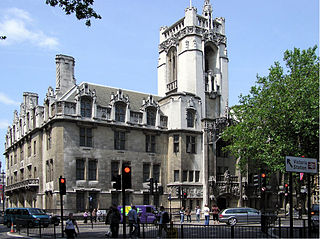Murray v United Kingdom was a legal case heard by the European Court of Human Rights in 1994 to determine if part of the United Kingdom's anti-terrorism laws were in violation of the Convention for the Protection of Human Rights and Fundamental Freedoms.

The European Court of Human Rights is a supranational or international court established by the European Convention on Human Rights. The court hears applications alleging that a contracting state has breached one or more of the human rights provisions concerning civil and political rights set out in the Convention and its protocols.

The United Kingdom (UK), officially the United Kingdom of Great Britain and Northern Ireland, is a sovereign country located off the north-western coast of the European mainland. The United Kingdom includes the island of Great Britain, the north-eastern part of the island of Ireland, and many smaller islands. Northern Ireland is the only part of the United Kingdom that shares a land border with another sovereign state, the Republic of Ireland. Apart from this land border, the United Kingdom is surrounded by the Atlantic Ocean, with the North Sea to the east, the English Channel to the south and the Celtic Sea to the south-west, giving it the 12th-longest coastline in the world. The Irish Sea lies between Great Britain and Ireland. With an area of 242,500 square kilometres (93,600 sq mi), the United Kingdom is the 78th-largest sovereign state in the world. It is also the 22nd-most populous country, with an estimated 66.0 million inhabitants in 2017.

Terrorism is, in the broadest sense, the use of intentionally indiscriminate violence as a means to create terror among masses of people; or fear to achieve a religious or political aim. It is used in this regard primarily to refer to violence during peacetime or in war against non-combatants. The terms "terrorist" and "terrorism" originated during the French Revolution of the late 18th century but gained mainstream popularity in the 1970s in news reports and books covering the conflicts in Northern Ireland, the Basque Country and Palestine. The increased use of suicide attacks from the 1980s onwards was typified by the September 11 attacks in New York City and Washington, D.C. in 2001.
The case was referred to the Court on 7 April 1993 from an application lodged on 28 September 1988 relating to events occurring in 1982. The case was heard in the Human Rights Building, Strasbourg, on 24 January 1994 and the Chamber delivered their judgement on 28 October 1994.

Strasbourg is the capital and largest city of the Grand Est region of France and is the official seat of the European Parliament. Located at the border with Germany in the historic region of Alsace, it is the capital of the Bas-Rhin department.
The applicants were six Irish citizens, all members of the same family: Margaret Murray, Thomas Murray, Mark Murray, Allana Murray, Michaela Murray and Rosena Murray.
In June 1982 two brothers of Margaret Murray were convicted in the United States in connection with the supplying of weapons to the Provisional Irish Republican Army (PIRA). Mrs Murray, her husband Thomas, and their four children were then residing in Belfast.

The United States of America (USA), commonly known as the United States or America, is a country comprising 50 states, a federal district, five major self-governing territories, and various possessions. At 3.8 million square miles, the United States is the world's third or fourth largest country by total area and is slightly smaller than the entire continent of Europe's 3.9 million square miles. With a population of over 327 million people, the U.S. is the third most populous country. The capital is Washington, D.C., and the largest city by population is New York City. Forty-eight states and the capital's federal district are contiguous in North America between Canada and Mexico. The State of Alaska is in the northwest corner of North America, bordered by Canada to the east and across the Bering Strait from Russia to the west. The State of Hawaii is an archipelago in the mid-Pacific Ocean. The U.S. territories are scattered about the Pacific Ocean and the Caribbean Sea, stretching across nine official time zones. The extremely diverse geography, climate, and wildlife of the United States make it one of the world's 17 megadiverse countries.

The Irish Republican Army, also known as the Provisional Irish Republican Army, was an Irish republican paramilitary organisation that sought to end British rule in Northern Ireland, facilitate the reunification of Ireland and bring about an independent republic encompassing all of Ireland. It was the biggest and most active republican paramilitary group during the Troubles. It saw itself as the successor to the original IRA and called itself simply the Irish Republican Army (IRA), or Óglaigh na hÉireann in Irish, and was broadly referred to as such by others. The IRA was designated an unlawful terrorist organisation in the United Kingdom and an unlawful organisation in the Republic of Ireland.

Belfast is a city in the United Kingdom, the capital city of Northern Ireland, standing on the banks of the River Lagan on the east coast of Ireland. It is the largest city in Northern Ireland and second-largest on the island of Ireland. It had a population of 333,871 as of 2015.
On the morning of 26 July, Margaret Murray was taken into custody by the Army on suspicion of fund-raising for the Provisional IRA in connection with her brothers' activities and taken to the Springfield Road screening centre. The style and procedure of her arrest was under section 14 of the Northern Ireland (Emergency Provisions) Act 1978, her suspected offences were contained with section 21 of the act and also section 10 of the Prevention of Terrorism (Temporary Provisions) Act 1976.
At Springfield Road, Mrs Murray gave her name but refused to answer any other questions and she also declined to be photographed or to submit to an examination by a medical orderly. She sat through two short interviews and was also photographed without her knowledge or consent. She was released after two hours without being charged; the "screening proforma" record form did not list any offence.
On 9 February 1984 Mrs Murray brought an action before the High Court against the Ministry of Defence for false imprisonment and other torts, arguing that her arrest and detention were illegal on a number of grounds - notably that they had been without genuine suspicion that she had committed an offence or any genuine intention to question her, it had been a "fishing expedition" for improper purposes. In his judgment of 25 October 1985 the judge dismissed all the plaintiff's arguments. Mrs Murray took her case to the Court of Appeal, which unanimously rejected her claims on 20 February 1987. The case was appealed to the House of Lords – on the manner of the arrest, the use of the screening proforma, and the length of detention – and was unanimously rejected on 25 May 1988.

The High Court of Justice in England is, together with the Court of Appeal and the Crown Court, one of the Senior Courts of England and Wales. Its name is abbreviated as EWHC for legal citation purposes.

The Ministry of Defence is the British government department responsible for implementing the defence policy set by Her Majesty's Government and is the headquarters of the British Armed Forces.
False imprisonment occurs when a person is restricted in their personal movement within any area without justification or consent. Actual physical restraint is not necessary for false imprisonment to occur. A false imprisonment claim may be made based upon private acts, or upon wrongful governmental detention. For detention by the police, proof of false imprisonment provides a basis to obtain a writ of habeas corpus.
The Murrays applied to the ECHR, as previously noted, in 1988. Mrs Murray stating that her arrest and detention were a violation of Article 5 (paragraphs 1, 2 and 5) and that the photograph and record taking was in breach of Article 8. Her family also applied under the same parts of Article 5 because they had been required to assemble in a single room of their house while Mrs Murray prepared to leave with the Army. They also applied under Article 8 in regard to the recording and retention of personal details. The entire family also applied that under Article 8 regarding the entry and visual search of their home and under Article 13 that no effective remedies existed under domestic law.
Article 5 of the European Convention on Human Rights provides that everyone has the right to liberty and security of person. Liberty and security of the person are taken as a "compound" concept - security of the person has not been subject to separate interpretation by the Court.
Article 5 – Right to liberty and security
1. Everyone has the right to liberty and security of person. No one shall be deprived of his liberty save in the following cases and in accordance with a procedure prescribed by law:
2. Everyone who is arrested shall be informed promptly, in a language which he or she understands, of the reasons for his arrest and of any charge against him.
3. Everyone arrested or detained in accordance with the provisions of paragraph 1.c of this article shall be brought promptly before a judge or other officer authorised by law to exercise judicial power and shall be entitled to trial within a reasonable time or to release pending trial. Release may be conditioned by guarantees to appear for trial.
4. Everyone who is deprived of his liberty by arrest or detention shall be entitled to take proceedings by which the lawfulness of his detention shall be decided speedily by a court and his release ordered if the detention is not lawful.
5. Everyone who has been the victim of arrest or detention in contravention of the provisions of this article shall have an enforceable right to compensation.
Article 8 of the European Convention on Human Rights provides a right to respect for one's "private and family life, his home and his correspondence", subject to certain restrictions that are "in accordance with law" and "necessary in a democratic society". The European Convention on Human Rights (ECHR) is an international treaty to protect human rights and fundamental freedoms in Europe.
In February 1993 the Commission supported the Murrays' application in part. There had been a violation of Article 5, but no violation of Article 8, or of Article 13 in regard to the entry and search, or the taking and keeping of a photograph and personal details, or concerning the lack of remedies in domestic law. The case went to a public hearing on 24 January 1994.
At the hearing the Court gave significant weight to the need for a democratic society to protect itself against the threat of organised terrorism and to the problems involved in the arrest and detention of persons suspected of terrorist-linked offences.
The Court dismissed Mrs Murray's claims against her arrest and detention under 5(1)(c); dismissed her contention that she had not been informed promptly of the reasons for the arrest and of any charge (5(2)). Since there had been no violation of 5(1) or 5(2) in the Court's opinion there could be no consideration of 5(5). The Court decided that there had been no violation of Article 8 as the Army's action had been in accordance with the law, as contained in paragraph two of the Article, and had not been disproportionate to the aim pursued. The Court dismissed the Murrays' claims of a violation of Article 13.
The Court's decisions were by majority – 14–4 in regard of Article 5(1), 13–5 in regard of Article 5(2), 13–5 in regard of Article 5(5), 15–3 in regard of Article 8, and unanimous in regard of Article 13.


